Recombinant Human Apolipoprotein B-100 (APOB) is produced in a yeast expression system, covering amino acids 28 to 127. This partial protein includes an N-terminal 6xHis tag to make purification and detection easier. The product achieves greater than 90% purity, as confirmed by SDS-PAGE analysis, which suggests it's reliable for research applications. This product is designed for research use only.
Apolipoprotein B-100 appears to be a crucial component of low-density lipoproteins (LDL) and plays a significant role in lipid transport and metabolism. It's essential for assembling and secreting very low-density lipoproteins (VLDL) and is integral to maintaining LDL particle structure. Understanding APOB's function may be vital for studies related to lipid disorders and cardiovascular research.
Potential Applications
Note: The applications listed below are based on what we know about this protein's biological functions, published research, and experience from experts in the field. However, we haven't fully tested all of these applications ourselves yet. We'd recommend running some preliminary tests first to make sure they work for your specific research goals.
Based on the provided information, recombinant human APOB fragment (28-127aa) is produced in a yeast expression system with an N-terminal 6xHis-tag. While yeast expression systems provide eukaryotic folding machinery that can support proper disulfide bond formation and post-translational modifications, APOB is an extremely large and complex lipoprotein (full-length 4536aa) whose structure and function depend on lipid association and extensive domain interactions. This small N-terminal fragment (100aa, representing only ~2% of full-length APOB) may not fold correctly independently, as its structural context depends on the full protein architecture and lipid binding. The His-tag may interfere with the native N-terminal structure. Purity >90% by SDS-PAGE under denaturing conditions does not confirm native folding. No validation data (e.g., lipid binding assays, structural analysis) are provided. Therefore, while yeast expression offers advantages over bacterial systems, the protein's folding status and bioactivity cannot be confirmed without experimental validation.
1. Antibody Development and Validation
This application is suitable, as antibody generation primarily relies on linear epitope recognition. The yeast expression system may produce properly folded protein with correct disulfide bonds, enhancing antibody quality. However, even if misfolded, the defined fragment provides specific epitopes for antibody production. Antibodies generated may recognize both linear and potentially conformational epitopes if the protein is properly folded.
2. Protein-Protein Interaction Studies
If correctly folded in the yeast system, this APOB fragment could be used to study interactions with binding partners, as the His-tag facilitates immobilization. However, if the fragment does not adopt its native conformation independently (likely without full protein context), interaction domains may be altered, compromising the biological relevance of identified partners.
3. Structural and Biochemical Characterization
If properly folded, the fragment could provide insights into the N-terminal domain structure of APOB. However, the isolated fragment may not represent its conformation in full-length APOB, and biophysical data should be interpreted with caution regarding biological relevance. The His-tag may also interfere with structural analyses.
4. ELISA-Based Quantitative Assays
The His-tag enables technical feasibility for ELISA development. If correctly folded, the protein can serve as a standard for N-terminal specific assays. However, if misfolded, it may not accurately represent native APOB epitopes, potentially affecting assay specificity for detecting full-length protein in biological samples.
Final Recommendation & Action Plan
This yeast-expressed APOB fragment has a higher probability of correct folding compared to bacterial systems but requires validation due to the complexity of APOB structure and the fragment's isolation from full protein context. Recommended actions: (1) Validate folding through biophysical methods (circular dichroism for secondary structure, size-exclusion chromatography for oligomeric state); (2) Test functionality through lipid binding assays if applicable to this domain; (3) For reliable interaction studies, confirm binding with known APOB partners; (4) Antibody development can proceed with higher confidence due to yeast expression, but validate against full-length APOB; (5) Structural data should be interpreted as specific to the isolated fragment rather than the full protein. Always include appropriate controls and consider that fragment behavior may not fully represent native APOB in lipoprotein complexes.






